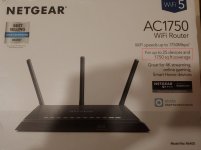I purchased a GS-AX3000 to replace a Netgear R6400. The Netgear simply could not seem to keep up with the number of devices I was trying to connect to it. That number was about 17 (mostly wifi but several wired too). At this point, adding another device caused problems with connections being dropped an not-re-eastablished, etc. I finally gave up fighting this and purchased the GS-AX3000 and things were immediately improved - what a relief!
I felt free to start adding devices to the router/network - mostly wifi. Aft first, this did not seem to make much of an issue. I did, however, need to start running scheduled reboots in the middle of the night, twice a week. Thankfully, ASUS-WRT made that easy enough.
However, I recently tried to add a new machine and that machine needed not only its own IP but two more IPs for the 2 VirtualBoxes it was to run. This brought the total to maybe 25 devices being connected. At this point I started to notice the same sort of sad behavior I was seeing in the old Netgear at about 17 devices. I think I can live with things this way. I am not sure if a router with more RAM or a fast processor would "fix" this and allow more devices to connect. It is just no clear to me what the limiting factor is.
Any input?
Thanks
I felt free to start adding devices to the router/network - mostly wifi. Aft first, this did not seem to make much of an issue. I did, however, need to start running scheduled reboots in the middle of the night, twice a week. Thankfully, ASUS-WRT made that easy enough.
However, I recently tried to add a new machine and that machine needed not only its own IP but two more IPs for the 2 VirtualBoxes it was to run. This brought the total to maybe 25 devices being connected. At this point I started to notice the same sort of sad behavior I was seeing in the old Netgear at about 17 devices. I think I can live with things this way. I am not sure if a router with more RAM or a fast processor would "fix" this and allow more devices to connect. It is just no clear to me what the limiting factor is.
Any input?
Thanks


